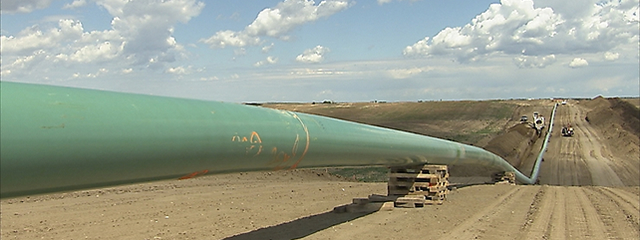South Dakota High Court Dismisses Appeal Against Keystone XL
PIERRE, S.D. (AP) – South Dakota’s Supreme Court this week dismissed an appeal from opponents of the Keystone XL oil pipeline, saying a lower court lacked jurisdiction to hear their cases. But an attorney battling the project says the "fight is not over."
Groups fighting TransCanada Corp.’s pipeline appealed a judge’s decision last year upholding regulators’ approval for the pipeline to cross the state. But the high court said in a Wednesday ruling that justices didn’t "reach the merits of the case" because the lower court didn’t have jurisdiction to weigh the appeal of the Public Utilities Commission’s decision.
TransCanada spokesman Terry Cunha said in an email that the pipeline developer is pleased with the court’s decision.

Keystone XL would cost an estimated $8 billion. The 1,179-mile pipeline would transport up to 830,000 bpd of Canadian crude through Montana and South Dakota to Nebraska, where it would connect with lines to carry oil to Gulf Coast refineries.
TransCanada announced in April it was meeting with landowners and starting aerial surveillance of the proposed route. The company hopes to begin construction in early 2019.
The Cheyenne River Sioux Tribe, Yankton Sioux Tribe and conservation and family agriculture group Dakota Rural Action appealed to the South Dakota high court after a judge had affirmed state regulators’ approval for the pipeline.
The Public Utilities Commission initially authorized TransCanada’s project in 2010, but the permit had to be revisited because construction didn’t start within the required four years. The panel voted in 2016 to accept TransCanada’s guarantee that it would meet all conditions laid out by the commission when it first approved that state’s portion of the project.
Cunha said the company is working to get needed land easements for the pipeline in Nebraska. But Nebraska landowners have filed a lawsuit challenging the Nebraska Public Service Commission’s decision to approve a route through the state.
Separately in Nebraska, a husband and wife who don’t want the proposed Keystone XL pipeline to run through their farm this week deeded a plot of their land to a Native American tribe, creating a potential roadblock for the project.
Art and Helen Tanderup signed over a 1.6-acre plot of land to the Ponca Indian Tribe on Sunday. The Ponca enjoy special legal status as a federally recognized tribe.
The land has been used as a planting space for sacred Ponca corn for the last five years, and it was chosen in part because it sits on the $8 billion pipeline’s proposed route. It’s also part of the historic Ponca route that tribe members were forced to take when the U.S. government relocated them to present-day Oklahoma in 1877.
"What the impact will be, I don’t know," Tanderup said. "But now, they’ll have a voice in this issue. They will be a player at the table."
It’s not clear whether deeding the land to the tribe would hinder the company or create a new legal argument for the Ponca, given their status as a federally recognized Indian tribe. Brad Jolly, an attorney for the Ponca Tribe of Nebraska, said he was focusing more on overturning state regulators’ approval of the pipeline in a case pending before the Nebraska Supreme Court.
"I haven’t gotten to all the what-ifs yet," Jolly said.
The Keystone pipeline also faces a potential obstacle in a federal lawsuit brought by Montana landowners and environmental groups seeks to overturn President Donald Trump’s decision to grant a presidential permit for the project.
Related News
Related News

- Enbridge Plans 86-Mile Pipeline Expansion, Bringing 850 Workers to Northern B.C.
- Intensity, Rainbow Energy to Build 344-Mile Gas Pipeline Across North Dakota
- Energy Transfer to Build $5.3 Billion Permian Gas Pipeline to Supply Southwest
- Enbridge Sees High Demand to Expand 593-Mile Canada-to-U.S. Gulf Oil Pipeline
- Strike Pioneers First-of-Its-Kind Pipe-in-Pipe Installation on Gulf Coast with Enbridge
- A Systematic Approach To Ensuring Pipeline Integrity
- 275-Mile Texas-to-Oklahoma Gas Pipeline Enters Open Season
- LNG Canada Start-Up Fails to Lift Gas Prices Amid Supply Glut
- Strike Pioneers First-of-Its-Kind Pipe-in-Pipe Installation on Gulf Coast with Enbridge
- Enbridge Sees High Demand to Expand 593-Mile Canada-to-U.S. Gulf Oil Pipeline




Comments